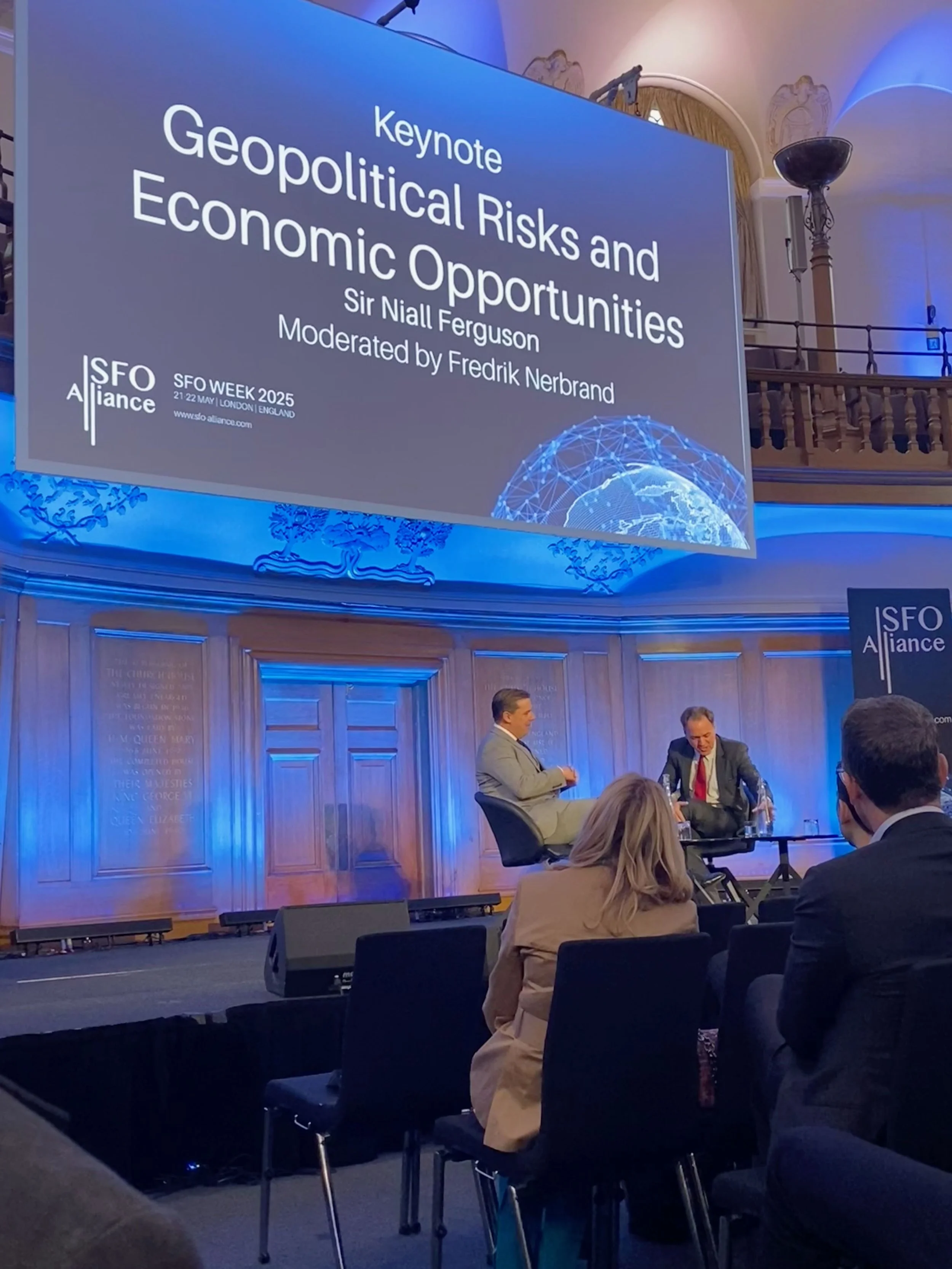Why Family Offices Are The Hidden Architects of Innovation
Last week, I had the privilege of again attending SFO Week 2025, where family offices, innovators and advisers came together to discuss the future.
A huge congratulations to the Single Family Office Alliance (SFO Alliance) for bringing together such an influential community of investors. In an era marked by geopolitical uncertainty, transformative technology, and generational change, bringing principals, advisors, and investors together in one space has never been more timely.
This year’s sessions surfaced powerful insights into the unique and growing role that single-family offices (SFOs) play in shaping the future of innovation, enterprise, and economic resilience.
From university spinouts to deeptech ventures, and from next-gen brand building to concentrated thematic portfolios, family offices are quietly assuming a role that traditional capital often cannot fulfil: that of patient, values-aligned, globally minded investors. VCs get the headlines, but VCs engage with family offices to secure capital and investment into their own funds.
And yet, the path is not without its challenges. SFOs must navigate macro risks, manage multigenerational expectations, and protect their legacy and reputation, all while unlocking capital for the next wave of innovators.
Innovation as a Strategic Imperative
The conversations across SFO Week clarified that innovation is no longer an opportunistic add-on to wealth management strategies. It is central to a family office’s long-term vision. Sessions such as “University Spin-Outs” and “Deeptech” revealed how SFOs are leaning into research-driven and science-based ventures that may take a decade or more to deliver returns but offer asymmetric upside and societal value.
Family offices are increasingly unbound by fund cycles and institutional reporting demands, unlike traditional VCs. This enables them to support early-stage founders, back university tech transfer efforts, and offer capital and long-term strategic alignment.
However, unlocking this innovation isn’t without its barriers. From the inconsistent spin-out terms that founders face at universities to the often-siloed approach between researchers and commercial stakeholders, there is a clear need for trusted, informed guidance and advisory. This is particularly important in sectors like artificial intelligence, semiconductors, and biotech, where national interest, regulation, and intellectual property cross paths.
The Role of Perception and Reputation
What became evident to me during the sessions is that reputation, trust, and perception are, at the same time, no longer intangibles. They are investment-critical. As one speaker noted in the session on family office structures, “reputation is an asset class in itself.”
In the world of spin-outs, for example, the perceived success of a university in supporting commercialisation directly affects its ability to attract world-class researchers and future investment. Similarly, founders choose backers based not just on capital, but on alignment, purpose, and perceived trustworthiness.
This is especially true in global innovation ecosystems. Family offices recognised as mission-driven, supportive, and discreet can unlock opportunities in highly regulated or sensitive sectors, from quantum computing to next-generation energy, in markets like Japan and Southeast Asia, where cultural fluency and stakeholder engagement matter as much as balance sheets, family offices with a thoughtful public and private reputation are significantly advantaged.
Navigating Geopolitics and Geoeconomics
The geopolitical backdrop to innovation investment cannot be ignored. In a wide-ranging discussion on global power dynamics, several sessions explored the re-emergence of multipolar tensions, especially between the US and China. And yes, we were told, rightly so, that we are witnessing and living through a second Cold War, one shaped not by nuclear weapons but by semiconductors, trade routes, and information warfare.
In this environment, capital is not neutral. In fact, in this environment, capital seeks safer jurisdictions. Family offices are thinking ahead, balancing opportunity with their exposure to risk, and diversifying their footprints.
This is where strategic clarity matters, not just to them, but to the innovators that benefit from their investment. Family offices investing in cross-border ventures must anticipate financial volatility and reputational and political exposure. This includes understanding where their capital flows, who their partners are, and how the geopolitical perceptions of their home country may influence dealmaking abroad.
Intergenerational Change and Next-Gen Purpose
The generational shift within family offices was another core theme that emerged. Sessions that discussed how younger family members are reshaping portfolios to reflect new technologies and values. They build brands, businesses, and investment theses around sustainability, health, inclusion, and purpose.
But with this ambition comes a need for deeper business support. Next-gens often face structural or governance hurdles in deploying capital or creating alignment between legacy strategies and future vision. They require mentorship, ecosystem access, and strategic storytelling to articulate and legitimise their initiatives, both within the family and in public view.
This is an important area for family offices to reflect on. Enabling the next generation to lead doesn’t just protect continuity. It creates relevance in an era where values and visibility matter; relevance and perception can be differentiators.
Focused Portfolios, Deep Conviction
The session on building a concentrated portfolio highlighted the conviction-led strategies that many family offices are now pursuing. Rather than chasing index-matching diversification, these offices go deep in areas they understand, from climate tech to fintech to life sciences.
With this focused approach comes both opportunity and risk. Without the cushion of broad diversification, reputation and access become even more critical. Whether backing a promising founder or securing a regulatory green light, family offices rely on their networks, brand, and ability to show up as committed, long-term partners.
This is also where alignment with policy and public interest plays a role. As government funding tightens and public trust in institutions fluctuates, family offices can become anchor investors in innovation ecosystems, but only if they are seen as constructive, patient, and strategically aligned.
From Capital to Capability
Across SFO Week, one theme resonated: single-family offices are evolving from passive wealth stewards to active system-builders. They are deploying capital with conviction, but also with conscience. They are seeking returns, but also relevance. And they recognise that the world of accelerating complexity, perception, positioning, and purpose is as vital as portfolio performance.
In many ways, family offices are uniquely positioned. They have the time horizon, the discretion, and the autonomy to take bold, long-view positions. But to fully realise their influence, they must invest not just in companies, but in capability, reputation, and strategy.
As the discussions at SFO Week 2025 revealed, those family offices that understand the power of aligned capital, narrative trust, and cross-border fluency will not only support the future of innovation. They will shape it.
And it’s worth remembering that it isn’t just start-ups and innovators that are looking for the support of family offices. It is also governments that are making this an international battle for capital that helps countries grow!






